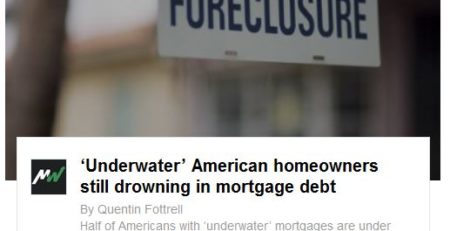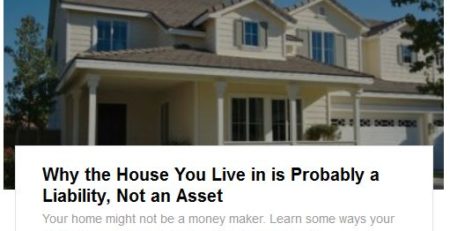Rich Dad Scam #6: Your House is an Asset
It seems like every financial “expert” says, “Your house is your biggest asset.” When I wrote Rich Dad Poor Dad, I said that your house was a liability. That was like spraying water on a hornets’ nest. The so-called experts lambasted me. At the time, the real estate market was skyrocketing. Everyone called me a contrarian, out to sell books. Today, after one of the worst housing crashes in US history, they aren’t laughing anymore.
Recently, I’ve been writing a series of posts on what I’m calling Rich Dad Scams, lies that are fed to people by the rich to keep them poor and in the middle class. Today, I’m going to write on one of the biggest Rich Dad Scams of all, “Your house is an asset.”
Money in, money out
Your financial planner, real estate agent, and accountant all call your house an asset. But in reality, an asset is only something that puts money in your pocket. If you have a house that you rent out to tenants, then it’s an asset. If you have a house, paid for or not, that you live in, then it can’t be an asset. Instead of putting money in your pocket, it takes money out of your pocket. That is the simple definition of a liability.
This is doubly true if you don’t own your home yet. Then it’s the bank’s asset, and it is working for them, but it’s not earning you anything.
So what is an asset?
In business terms, assets are your pros and liabilities are your cons. You need assets to offset your liabilities. Once you get away from the Rich Dad Scams, it’s easier to think in those terms, to think like an entrepreneur. But what exactly are assets?
The simple definition of an asset is something that puts money in your pocket. This is accomplished through four different categories, one of which is real estate. When I say real estate, I don’t mean your personal residence, which is a liability. What I mean is investment real estate, which is a great investment because it puts money in your pocket each month in the form of rent.
There are three other primary assets: business, paper, and commodities. If you are an entrepreneur or a business owner, your business is an asset. Paper assets are stocks, bonds, mutual funds, and so on. Finally, commodities include gold, and other resources like oil and gas, and so on.
My wife and I started out making our money in real estate, putting our money to work in properties that we could rent them out and see ongoing returns. After that, we diversified, so now we have some money in all of four of these asset areas.
Invest for cash flow, not appreciation
The Rich Dad Scam that your home is an asset was prevalent when I first wrote Rich Dad Poor Dad. That was in 1997, and everyone’s home values were climbing. It was easy to assume that your house was an asset because it was potentially making money for you in the long run through appreciation. People bought into the scam hook, line, and sinker, taking out home equity loans to buy cars, vacations, TV’s, and more. Today, those same people are so underwater that many of them are defaulting and going into foreclosure. Most people aren’t saying their home is an asset any longer.
A lot of Americans got a fast, ugly financial education when the real estate market turned around. They realized very quickly that their homes were not assets.
The difference between my poor dad and my rich dad was a financial education. And that’s not a classroom and books education, that’s a nuts-and-bolts, street-smart education, a way of looking at money that is true and that works, not just what the rich want you to believe.
Rather than invest for appreciation, my rich dad taught me to invest for cash flow and to treat appreciation like icing on a cake. I encourage you to do the same.



Leave a Reply